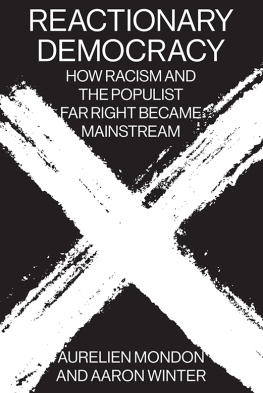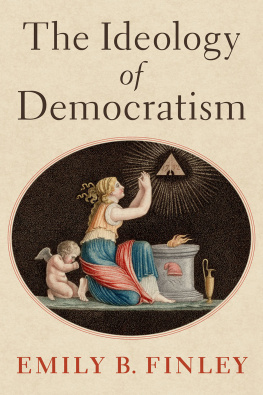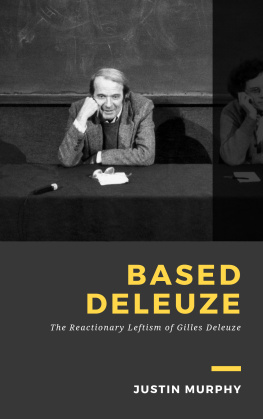Contents

Reactionary Democracy
Aurelien Mondon is a senior lecturer in Politics at the University of Bath. His first book, The Mainstreaming of the Extreme Right in France and Australia: A Populist Hegemony?, was published in 2013 and he recently co-edited After Charlie Hebdo: Terror, Racism and Free Speech (2017).
Aaron Winter is Senior Lecturer in Criminology at the University of East London. He is co-editor of Discourses and Practices of Terrorism: Interrogating Terror and Historical Perspectives on Organised Crime and Terrorism.
Reactionary Democracy
How Racism and the Populist
Far Right Became Mainstream
Aurelien Mondon and Aaron Winter

First published by Verso 2020
Aurelien Mondon and Aaron Winter 2020
All rights reserved
The moral rights of the authors have been asserted
1 3 5 7 9 10 8 6 4 2
Verso
UK: 6 Meard Street, London W1F 0EG
US: 20 Jay Street, Suite 1010, Brooklyn, NY 11201
versobooks.com
Verso is the imprint of New Left Books
ISBN-13: 978-1-78873-423-3
ISBN-13: 978-1-78873-422-6 (HBK)
ISBN-13: 978-1-78873-424-0 (UK EBK)
ISBN-13: 978-1-78873-425-7 (US EBK)
British Library Cataloguing in Publication Data
A catalogue record for this book is available from the British Library
Library of Congress Control Number
2020932048
Typeset in Minion Pro by Hewer Text UK Ltd, Edinburgh
Printed and bound by CPI Group (UK) Ltd, Croydon CR0 4YY
For Alex, Alexandra, Matthew and Shane.
Contents
We would like to thank the many friends, relatives, colleagues and students who helped us with this project through their time and energy, intellectual and political engagement and example. There are too many of you to name, but you know who you are and we hope you also know how grateful we are for your support.
Confronting the great resurgence of white supremacist organizations and seeing the rhetoric and beliefs of these groups surface as part of accepted discourse in every aspect of daily life in the United States startles, frightens and is enough to throw one back into silence These days white racism can let it all hang out, hold nothing back.
bell hooks, 1995
bell hookss words sound even truer today than they did in 1995. The mainstreaming of the far right has not only legitimised its politics, but also strengthened systemic racism and emboldened racists of all kinds. In recent years, the election of Donald Trump, the vote for Brexit and Marine Le Pens accession to the second round of the French presidential election with over 30 per cent of the vote have marked a new level in the resurgence and rise of far-right politics. This is not limited to the three cases central to this book the United States, France and the United Kingdom: the Lega in Italy and the Freedom Party of Austria both entered governing coalitions on the back of strong electoral performances, even though both failed to hold on to power for long. The rightward turn of former mainstream parties in central Europe also has compounded this effect among far-right parties vying for power in much of Europe. Despite its relatively high living standards, Scandinavia has not been spared this trend; and recently Spain, which had so far resisted it, has witnessed the rise of its own far-right party, Vox. Outside Europe and the United States, the far right has also made gains with Jair Bolsonaros victory in Brazil, and has continued to influence politics in Australia, for example. Far-right violence has also become increasingly common, from daily microaggressions and racist incidents to terrorist attacks such as the one in Christchurch on 15 March 2019, where fifty Muslims were killed.
All this has led to the publication of countless books and articles about the far right, racism and, more recently, populism. Countless This appears to have somewhat shattered the comfortable denial afforded by the spurious post-race narrative, which holds that racism is something of the past, defeated by the forces of liberalism and liberal democracy, and that it could only ever be found in individualised and pathologised pockets of the most extreme right. Of course, this was always little comfort to those at the sharp end of more covert, systemic racism, those left to face daily discrimination and oppression deeply rooted in our political system. Yet, things have worsened in recent times. We argue that the rise and mainstreaming of the far right not only distract us from existing systemic racism, but legitimise its cruder expressions by giving them platforms. This has served to place concerns about systemic racism further in the back of the liberal mind, as it focuses instead on the extreme and far right. We argue that liberal democracies have become consumed by a fight for survival against a threat they have themselves nurtured, to divert attention away from their inability to respond to the inequalities and growing number of historical crises fuelled by capitalism and its innate conflict with liberal-democratic ideals of liberty and equality.
In this context, we ground our understanding of current events specifically the mainstreaming of racism and the far right in history and wider power structures. Contrary to the idea that progress is unidirectional or unavoidable, we argue here that what we witness today cannot be understood in a linear fashion whereby movements, ideas and ideologies move gradually towards the end of history. Instead, we maintain that the history of racism and the far right, from their inception to the forms they take in the present, should be seen in the same way as other ideologies and social formations: in constant, messy, contested and adaptive evolution, and subject to wider social forces and contingencies. We explore how common sense and popular will (the will of the people) are constructed to defend certain ideas. This is not an exercise in pointing the finger at particular culprits, but, rather, an in-depth exploration of how power is constructed through processes and narratives.
Yet, the larger aim of this book is to provide the necessary clarity and focus to understand this threat more holistically. At a time when we are beset by multiple crises economic, social, environmental we believe that it is essential that we do not become side-tracked by the forces of reaction. This can only lead to further harm being done to the more vulnerable and racialised groups they scapegoat and target in a strategy of distraction and deflection and will delay actions that are urgently necessary to address these crises on a global scale, as they force us to return to narrow and destructive nationalist politics. To this end, we cannot rely on the mainstream as essentially virtuous and wait passively for things to fix themselves. It has become obvious that solutions will come at a clear cost and will demand radical change something our current model, and the elite shaping it, have preferred to ignore and even prevent to protect their interests. While this book is aimed at a broad audience, we expect that many of those who will have the opportunity to read it will also have the space to think and act. To them we say: apathy is a political choice, and a reactionary one. Things do not have to be this way.
This book builds on our research, bringing together the various strands of enquiry and analysis we have developed over the years. Our interdisciplinary background is not only a strength, but in fact essential to reaching a more complete understanding of the situation. Research on the far right and associated fields has grown tremendously in recent years, raising questions and concerns about our role as researchers in the coverage we provide to such ideas. That increasing attention has been paid to these parties, movements and ideas is to be commended: they are not only a fact of social life, but also a threat to many. However, recent trends in academia, under the pressure of the neoliberalisation of research, have led to a number of problematic developments. Claims that the study of politics and society can be conducted just like any other scientific research have led many to ignore their own standpoint, privilege and accountability with respect to the matter they study. We do not believe that objectivity in research can be achieved. We do not hide the fact that we take sides: racists and anti-racists are not equivalent, and we do not stand in the middle or above as objective bystanders. We recognise both our ideological standpoint and our privileged positions. We are clearly and unashamedly anti-racist researchers. Does that make us less objective researchers than those who uncritically state their objectivity in order to push reactionary agendas under the guise of science? Does that make us more biased than those who refuse to acknowledge their ideological standpoint or privilege (institutional, racial and/or gendered)? We do not think so.









